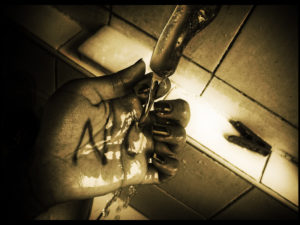You have no items in your cart. Want to get some nice things?
Go shopping
My assault was like this.
I was drunk. I was alone. It was Halloween and my friends and I had gone to this party at a house near my university, but, at some point that I now can’t remember, my friends disappeared.
I’d been talking to the guy that assaulted me. I remember that he said he liked the New England Patriots. I remember that he went to the Naval Academy. I remember that he ran track for them.
But, more than anything else, I remember standing on the steps outside my dorm later that night – I don’t remember how we got back, though knowing the campus as I do, I could probably guess which path we took – and pushing him back after he’d kissed me and telling him no.
I remember telling him three times.
I remember realising, drunk, alone, with a strange man whose full name I didn’t catch, that I had a choice to make. A choice with some potentially very bad consequences.
I remember swiping my card and letting him upstairs. I remember the sinking feeling in my stomach, the beginnings of shame and disgust already eating away at me. I remember thinking about walking into my friend’s room, the one on the first floor who always left his door open, and refusing to leave until this stranger was gone. I remember thinking about telling him my roommate was there, that he’d have to leave.
I remember thinking about knocking on any door and asking anyone to get me out of this.
But it was the middle of the night and there was no one to get me out of this.
It took me a long time to admit that what happened that night wasn’t okay. For me to call it what it was. I always thought, in that misguided way that you often do, that my experience wasn’t bad enough to count. I didn’t physically fight him. I let him into my building. I let him into my room. It would never stand up in a court of law and, therefore, it didn’t count.
Never mind the fact that so many of these cases never stand up in a court of law. Never mind the fact that I was alone and disgusted and wanted to be anywhere else and I was viscerally aware of all of those things. At the end of the day, I made the decision.
It took me a long time to realise that you can’t really call it a decision when you’re feeling like there isn’t any safe way out. When it feels like you’re pressed up against a wall.
If you’ve said no and that no hasn’t been respected, it counts. If you said no again and again and again and then you give in because you worry about the consequences of saying no again, it counts.
I’ve been thinking about this a lot, especially over the last few weeks, in the light of, well, everything. I’ve been thinking about those conversations that, as they often do, almost always come around to the same question: “Why did you wait so long to come forward? Why didn’t you ever say anything?”
I haven’t come forward. I suppose I am now, but I haven’t reported it through the official channels. There are too few details, too many grey areas, too many spaces for speculation. I haven’t told my family, though I suppose I’m telling them now. Many people in my family, as a matter of fact, believe the encounter to be consensual.
I haven’t bothered to correct them. I should, probably, because the jokes about fleet week and “Navy boys” and all the rest are increasingly hard to bear, especially these days, but I worry more about the weight of my family’s denial of what happened to me. I worry about their reaction. I worry about forcing them to carry the burden of this thing that I’ve been carrying alone.
I worry about my son, the product of that night, thinking that I somehow love him any less because of how he came to be.
I hold this story, as so many people hold their stories, close to my chest because I cannot bear for their repercussions to spread any further. I cannot bear for my son to ask me if I love him in spite of it all, I cannot bear to look my father in the eye and explain what happened, cannot bear to find out whether or not he’ll believe me. I want to believe the best in him, want to believe that he’ll believe me, but what if it wasn’t bad enough? What if he doesn’t think it counts?
But, too, I know that learning I was holding this secret would hurt him. The fact that I didn’t trust him with this, that I didn’t feel like I could talk to him about it. But, if he believes me, will he even know what to do with this new weight? Will he know how to carry it? Will he know how to shift it around, to hide it in the back of his mind so that it isn’t floating around in the front of his head and making it impossible to breathe? I’ve been carrying this and I know where the holds are, and, sometimes, I don’t see the point in loading it off onto anyone else. And I realise, in typing this, that it’s a little ironic that I’m interested in protecting a man’s feelings, that I’m interested in shielding a man from my pain, my experience.
It should be the last thing that I consider, especially when the family narrative is that I was too drunk, too stupid, too slutty in university for my own good, but my son is wonderful and so, ultimately, isn’t it all fine? Didn’t it all work out?
It is impossible to talk about my assault, when I do talk about it, without these qualifiers. Without saying that yes, of course I love my son, that no, I would never regret him. It is impossible to explain the complexity of the things that I feel, to explain that I can’t remember what happened to me without suddenly feeling like I can’t breathe, to explain that, somehow, I almost never remember what happened to me when I’m looking at my son. To explain that he doesn’t conjure up images of that night, that that night, somehow, exists entirely separately from him in my mind.
It is impossible to untangle the threads because “I wish this hadn’t happened to me” also means “I wish my son didn’t exist”, and how do you ever untangle that? How do you ever say what you mean? How are you ever confident, completely confident, that you know what it is that you mean anyway?
And that, when I get down to it, is what my assault has done to me. It’s made that piece of my life a series of questions I don’t feel like I get to answer. It has made sure that I’m no longer the authority on my own experience.
I, and so many other survivors, have to walk on eggshells around those we love, have to hide the things that have, in so many ways, changed who we are. We have to wonder, over and over again, if what happened to us was our fault, if it was enough, if it still matters, if it counts.

About Elle Everhart
Elle Everhart is a writer and university staffer in the Department of Gender, Women's, + Sexuality Studies at UMBC. She received her MA in English from the University of Virginia before moving home to Baltimore with her son. Her writing to date includes an essay with Litro, some self-published fiction on her blog, and academic articles about Victorian novels and ecology.
- Web |
- More Posts(2)




2 comments